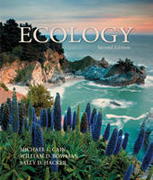
As well as emphasising the links to evolution, 'Ecology 'covers all the levels of the ecological hierarchy at which the subject is studied. It focuses on their integration to ensure that students are able to grasp how events in nature are interconnected. This new edition is now an even better learning and teaching tool. MICHAEL L. CAIN, having opted for an early retirement to focus full-time on writing, continues to bring his expertise to this book. Dr. Cain received his Ph.D. in Ecology and Evolutionary Biology from Cornell University, USA, taught at New Mexico State University, USA and the Rose-Hulman Institute of Technology, USA, and is currently affiliated with Bowdoin College, USA. He has instructed students across a wide range of subjects, including introductory biology, ecology, field ecology, evolution, botany, mathematical biology, and biostatistics. His research interests include: plant population ecology; long-distance dispersal; ecological and evolutionary dynamics in hybrid zones; and spatialspread and search behavior in plants and animals. WILLIAM D. BOWMAN is Professor at the University of Colorado at Boulder, USA, affiliated with both the Department of Ecology and Evolutionary Biology and the Institute of Arctic and Alpine Research. He earned his Ph.D. from Duke University, USA. Dr. Bowman has taught courses in introductory ecology, plant ecology, plantb soil interactions, and ecosystems ecology, and for several years has directed undergraduate summer field research programs. He is co-editor of the 2001 book, 'Structure andFunction of an Alpine Ecosystem, Niwot Ridge, Colorado' (Oxford University Press). His research focuses on plant ecology, biogeochemistry, and community dynamics. SALLY D. HACKER is Associate Professor in the Department of Zoology atOregon State University, USA. She received her Ph.D. from the Department of Ecology and Evolutionary Biology at Brown University, USA. She has taught courses in general ecology, community ecology, marine biology, and field ecology. As a community ecologist interested in natural and managed marine, dune, and estuarine communities, Dr. Hacker's research explores species interactions and how they influence community formation and species diversity. INDICE: Introduction: The Web of Life Unit I: Organisms and Their Environment - The Physical Environment - The Biosphere - Coping with Environmental Variation: Temperature and Water - Coping with Environmental Variation: Energy - Evolution and Ecology Unit II: Populations - Life History - Population Distribution and Abundance - Population Growth and Regulation - Population Dynamics Unit III: Interactions among Organisms - Competition - Predation and Herbivory - Parasitism - Mutualism and Commensalism Unit IV: Communities - The Nature ofCommunities - Change in Communities - Biogeography - Species Diversity in Communities Unit V: Ecosystems - Production - Energy Flow and Food Webs - Nutrient Supply and Cycling Unit VI: Applied and Large-Scale Ecology - Conservation Biology - Landscape Ecology and Ecosystem Management - Global Ecology -
- ISBN: 978-0-87893-445-4
- Editorial: Sinauer
- Encuadernacion: Cartoné
- Páginas: 648
- Fecha Publicación: 17/03/2011
- Nº Volúmenes: 1
- Idioma: Inglés
